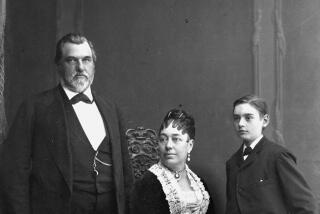Discord, Suspicions Mark Murder Case : Courts: Richard Overton faces trial in cyanide death of his wife, a popular school trustee. Both clung to deep secrets about their marriage and personal lives, records and interviews show.
- Share via
SANTA ANA — She was a lively, gregarious woman who did her own car repairs and plunged selflessly into the world of public education. He, though polite, was a bookish, self-absorbed man who held a keen interest in computers and exuded an intellectual arrogance.
Janet L. Overton, an 11-year trustee of the Capistrano Unified School District, had lots of friends. On occasion she would show her appreciation of the district’s bus drivers by delivering them doughnuts.
Her husband, Richard K. Overton, was an itinerant college lecturer and business consultant who knew few people well and was jealous of his wife’s celebrity status in the community. One family friend said that Richard and Jan wouldn’t replace the dilapidated refrigerator at their Dana Point home because of a disagreement over which one should pay for it.
Jan and Richard’s mutual interests in computers seemed to be one of the few pursuits they shared. Yet, beneath what many saw, the Overtons had something else in common: Both clung to deep secrets about their marriage and personal lives.
Interviews and court documents unsealed last week show that the Overtons’ 19-year marriage was racked with discord. There were money problems. There were suspicions of infidelity.
It all ended when Jan Overton collapsed suddenly and died on Sunday, Jan. 24, 1988, a day that she and her son, Eric, were to go whale watching on a boat with family friends.
Now, nearly four years later, the question is whether 63-year-old Richard Overton--as a grand jury has charged--murdered his 46-year-old wife by poisoning her with cyanide.
Defense attorney Robert D. Chatterton of Orange has declined to discuss the case and has just begun to develop his defense for the trial, which has been set for Jan. 27.
Chatterton said only, “He’s not guilty.” Overton, who remains free on $250,000 bail, declined to comment.
Authorities have spent three years probing the death, one of the longest investigations in the history of the Orange County Sheriff’s Department. The intrigue of it all has left friends and acquaintances of the Overtons puzzled, frustrated and angry.
“I think I’ve read this whole thing in Agatha Christie,” said Hugh J. Scallon, a Dana Point attorney whom Janet Overton once hired. “This is an incredible case.”
Affidavits filed by investigators in support of search warrants indicate that Jan Overton’s $100,000 inheritance from her deceased mother and Richard Overton’s suspicions that she had affairs with two men may be presented as motives for her slaying.
The affidavits, unsealed last week, also include allegations that Richard Overton poisoned Jan over many years with toxic levels of selenium, which is potentially lethal when mixed in certain compounds.
What court documents do not say is that Jan Overton’s death--indeed aspects of the last months of her life--remain a macabre mystery:
Hers is the story of an otherwise cheerful woman who was terrorized during those final months by agonizing dehydration, which defied medical diagnosis, and by lesions so painful that the friction of her clothes was almost unbearable. Investigators have said those lesions were “consistent” with selenium poisoning.
Also unanswered by court documents is why Richard Overton was not prosecuted in 1973--even though, according to a sheriff’s investigator’s report--he had admitted to authorities that he tried to poison his then-wife, Dorothy. The records show that 15 years later, the recollections and suspicions of Dorothy Boyer would spur investigators to begin viewing Jan Overton’s death as murder.
Based on court documents that have surfaced so far, it appears unlikely that Richard Overton would now stand accused of murdering his third wife, Jan Overton, were it not for the emergence of Boyer, his first wife.
It was Boyer who suggested to authorities in July, 1988, that Jan Overton’s death may have involved foul play, according to affidavits by investigators. Richard Overton, Boyer said, had tried to poison her a decade earlier.
According to investigators, Boyer said that Overton, with whom she raised four children, had tried to “murder me through a process of slow poisoning” after they divorced in 1969. She claimed that Overton broke into her house in the early 1970s and spiked her food and drink. Investigators determined subsequently that Boyer’s shampoo, milk and coffee contained selenium.
According to the sheriff’s investigator who examined Boyer’s complaint in 1973, Richard Overton confessed to having tried to poison Boyer and agreed to seek psychological counseling. He was not charged, and officials with the district attorney’s office and the Sheriff’s Department said last week that they were unable to explain why.
Nevertheless, court documents show that after Boyer came forward in July, 1988, investigators began focusing on Richard Overton as a suspect in his wife’s death. Later, they would speculate in sworn statements that Overton, as he had allegedly done to Boyer, tried to poison Jan Overton with selenium.
Boyer’s role in jump-starting the investigation of Richard Overton did not end with the tips she passed on in July, 1988. The following month she brought investigators physical evidence.
After visiting Overton’s house with one of their daughters, Boyer said, she found in Richard Overton’s desk drawer a woman’s eyeliner, rubber gloves, an electronic device containing selenium and a syringe. Tests found that the eyeliner contained selenium, according to affidavits by investigators.
Their divorce documents show that Boyer and Overton’s marriage dissolved in 1969 after she learned that Overton, while still married to her, had secretly married another woman with whom he had a child. That other woman, Caroline Hutcheson, who knew Overton as Richard Halderman, got an annulment just before Boyer’s divorce.
Richard Overton has married a fourth time, to Carol Townsend of Laguna Niguel.
In February, 1989--13 months after Jan Overton’s funeral--authorities revealed that she had died of cyanide poisoning.
“It’s still hard to believe Janet is gone,” Richard Overton told a Times reporter on Feb. 23, 1989. “Now this comes along. It’s really just impossible to believe.”
After having first attributed Jan Overton’s death to natural causes, “pending investigation,” an amended death certificate, dated Dec. 21, 1988, said she died of acute cyanide intoxication. The second round of autopsy tests, performed on body samples that had been frozen, also found levels of selenium.
Now that Richard Overton has been charged with murder, a number of the couple’s acquaintances have told The Times that Jan Overton was unhappy in her marriage, that she wanted to prevent Richard from sharing in a $100,000 inheritance, that Richard was jealous and suspected her of being unfaithful.
One longtime acquaintance of Richard Overton’s said that although he wants to give him “the benefit of the doubt” regarding the murder charge, he nonetheless believed that Richard resented Jan.
Russell S. Burkett, a conservative community activist, said that he and Richard Overton were members of an informal breakfast group that met at Molly’s cafe in San Juan Capistrano. Overton’s meal was predictable: oatmeal, toast and decaffeinated coffee.
Did Richard Overton, holder of a doctorate in psychology, resent the popularity and celebrity enjoyed by Jan, who did not hold an undergraduate degree?
“I would say definitely, he resented it,” Burkett said. “He felt that he was smarter than his wife. . . . He was just amazed that she could be elected, that she could be popular, and that she could be this commanding, progressive presence in the district.”
As for the crippling lesions that Jan Overton was suffering during the last months of her life, Burkett recalled that Richard “said it was the darndest thing. . . . He seemed to be rational about it. Very calm. . . . He’s very controlled. He would be an ideal chess player.”
More to Read
Sign up for Essential California
The most important California stories and recommendations in your inbox every morning.
You may occasionally receive promotional content from the Los Angeles Times.











